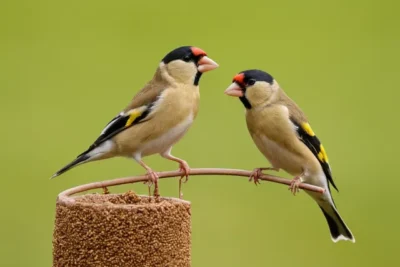

When it comes to feeding your canary, it's important to understand their nutritional needs. Canaries are small birds that require a diet rich in vitamins, minerals, and proteins to maintain their health and well-being. A balanced diet is crucial for their growth, development, and overall longevity.
A balanced diet is essential for canaries as it provides them with all the necessary nutrients they need to thrive. A well-balanced diet consists of a combination of seeds, fresh fruits and vegetables, pellets or commercial bird food, and occasional treats and supplements.
Seeds are a staple in a canary's diet and should make up a significant portion of their daily food intake. Canary seed mixes are readily available in pet stores and typically contain a combination of different seeds such as millet, sunflower seeds, and hemp seeds. These seeds provide canaries with essential fats, proteins, and carbohydrates.
It's important to note that while seeds are an important part of a canary's diet, they should not be the sole source of nutrition. A diet consisting solely of seeds can lead to nutritional deficiencies and health problems in the long run.
In addition to seeds, fresh fruits and vegetables should be included in a canary's diet to provide them with a variety of nutrients. Canaries can enjoy a wide range of fruits and vegetables such as apples, oranges, carrots, spinach, and broccoli.
When offering fruits and vegetables to your canary, make sure to wash them thoroughly and cut them into small, bite-sized pieces. This will make it easier for your bird to consume and digest them.
Pellets and commercial bird food can be a convenient option for providing canaries with a well-balanced diet. These products are specially formulated to meet the nutritional needs of birds and often contain a blend of seeds, grains, fruits, and vegetables.
While pellets and commercial bird food can be a good addition to a canary's diet, they should not replace fresh fruits, vegetables, and seeds entirely. It's important to offer a variety of foods to ensure your canary receives all the necessary nutrients.
Treats and supplements can be given to canaries in moderation to add variety to their diet and provide additional nutrients. However, it's important to remember that treats should not make up a significant portion of their daily food intake.
When choosing treats for your canary, opt for healthy options such as dried fruits, mealworms, or small pieces of cooked egg. Avoid giving them sugary or fatty treats as they can lead to weight gain and other health issues.
Supplements such as calcium or vitamin drops can be beneficial for canaries, especially during breeding or molting periods. However, it's important to consult with a veterinarian before adding any supplements to your canary's diet.
Water is an essential part of a canary's diet and should be available to them at all times. Make sure to provide fresh, clean water in a shallow dish or a water dispenser that is easily accessible to your bird.
It's important to change the water daily to prevent the growth of bacteria or algae. Additionally, during hot weather or if your canary is particularly active, you may need to refill the water more frequently to ensure they stay hydrated.
Establishing a feeding schedule and practicing portion control is important to ensure your canary receives the right amount of food without overeating. Canaries should be fed once or twice a day, depending on their age and activity level.
Monitor your canary's food intake and adjust the portion sizes accordingly. It's important not to overfeed your bird as obesity can lead to various health problems. If you notice that your canary is consistently leaving food behind, you may be offering too much.
When it comes to feeding your canary, there are a few common mistakes to avoid:
Over-reliance on seeds: While seeds are an important part of a canary's diet, they should not be the only source of nutrition. Make sure to offer a variety of foods to ensure a well-balanced diet.
Feeding unhealthy treats: Avoid giving your canary treats that are high in sugar or fat. Opt for healthier options such as dried fruits or small pieces of cooked egg.
Not providing enough variety: Canaries thrive on a diverse diet. Make sure to offer a variety of seeds, fruits, vegetables, and pellets to ensure they receive all the necessary nutrients.
Not consulting a veterinarian: If you have any concerns about your canary's diet or overall health, it's always best to consult with a veterinarian who specializes in avian care.
Every canary is unique, and their dietary needs may vary. If you have any specific concerns or questions about feeding your canary, it's always best to consult with a veterinarian who can provide personalized advice based on your bird's individual needs.
A veterinarian can assess your canary's overall health, recommend specific dietary changes if necessary, and provide guidance on portion sizes and feeding schedules.
Remember, providing a well-balanced diet is essential for the health and well-being of your canary. By understanding their nutritional needs and offering a variety of foods, you can ensure that your pet bird lives a long, happy, and healthy life.
Related posts